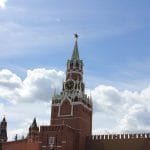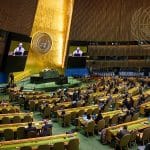After meeting in Brussels on May 28, Greek Foreign Minister Nikos Kotzias and Macedonia/FYROM Foreign Minister Nikola Dimitrov announced they had completed work on the draft bilateral agreements under negotiation to resolve the Name Dispute. After a few days of technical review, these documents would be sent to their respective prime ministers to negotiate, at least telephonically at first, with a view to getting the deal hammered out in as short a time as possible.
Recovering adeptly from the “Republic of Ilinden Macedonia” fiasco that emerged in the Bulgarian capital of Sofia during the May 17 EU-Western Balkans Summit, when both countries’ prime ministers met for an extended period, the foreign ministers of Greece and Macedonia/FYROM announced in Brussels on May 28 that they had completed their work on a draft agreement and would be handing the documents over to their respective prime ministers to negotiate and finalize.
“We the foreign ministers have finished everything that was assigned to us by the prime ministers of the two countries,” Kotzias said. Foreign Minister Dimitrov was also extremely positive. “We had a constructive discussion and have the framework of a compromise,” Dimitrov said, also stating that his country’s Prime Minister Zoran Zaev would be meeting his Greek counterpart within the next week to discuss the proposal.
As this announcement was made on the sidelines of an EU foreign ministers meeting (the Foreign Affairs Council), the reaction of EU FM’s and officials was enthusiastic and has opened a realistic prospect of achieving the June 28-29 EU Summit objective for extending an invitation to Macedonia/FYROM to begin EU accession talks, with Greece approving. “We are all very encouraged by the progress made especially on the negotiations between Skopje and Athens on the name issue,” said EU Commission Vice President and High Representative for Foreign Affairs and Security Policy Federica Mogherini.
The documents going to the prime ministers for highest-level negotiation have not yet been released or leaked so far, so it is unclear how much progress on the core issues was made and what compromises were hammered out by UN Mediator Matthew Nimetz who worked intensively with Greek Foreign Minister Kotzias and Macedonia/FYROM Foreign Minister Dimitrov in New York on May 24-25. Nimetz’ s remarks to the press on the 25th did not leave observers with the impression that the phase of discussion by foreign ministers was quite so close to ending, although he clearly emphasized that differences had narrowed significantly. Nevertheless, the sense in Athens on May 28 was that some key questions remained unresolved and that the proposed sequencing of agreements and invitations would not give Athens the comfort of seeing its demands fulfilled for constitutional changes by Skopje in the short term.
Early Reaction – things to watch
With Greece already in pre-election mode and the May 28 announcement coming on a Greek Orthodox religious holiday, the political reaction will emerge gradually in the next days. The domestic reaction as the draft agreement is processed through the next phase in Athens will be intense, precisely because it factors so fundamentally into the current Greek electoral calculus. The two main points to watch will be the force of the planned “Macedonia is Greek” protest demonstrations set for June 6 in Athens and Thessaloniki, announced several days before the May 28 Brussels meeting of the foreign ministers, and the impact of any agreement on the ruling SYRIZA-Independent Greeks (ANEL) coalition. ANEL President and Defense Minister Panos Kammenos has repeatedly stated he would not support an agreement that allows the word “Macedonia” to be part of the new hybrid name which is yet-to-be-agreed. He is now in the difficult position of not wanting to precipitate elections before Prime Minister Alexis Tsipras is ready and will have to face his NATO Defense Minister colleagues at the July Bucharest Summit and explain Greece’s actions nonetheless.
That might turn out to be the least of his problems.
Name Dispute talks progress as foreign ministers produce a draft agreement
FM’s kick the tough decisions up to the Prime Minister level
- Advertisement -
- Advertisement -







